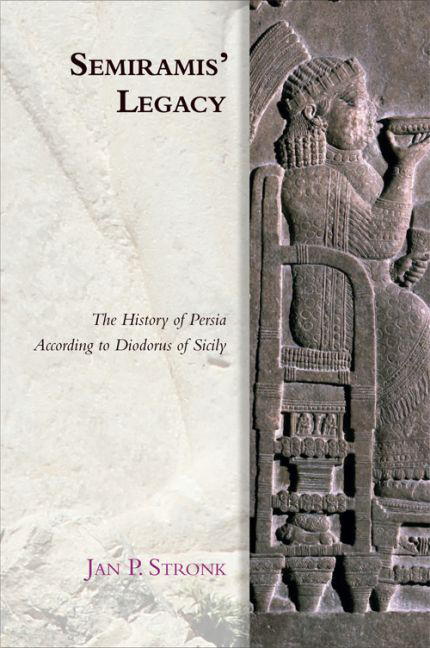Book contents
- Frontmatter
- Contents
- List of Figures and Tables
- Preface
- Abbreviations
- Series Editor's Preface
- Map
- Introduction: Diodorus' Work and Our Sources
- 1 Diodorus’ Sources
- 2 Ancient History: Assyrians, Chaldeans, and Medes
- 3 The Persians and the Greek Wars
- 4 Revolt and Sedition
- 5 Alexander the Great Defeats Darius III
- 6 From Persepolis to Babylon
- 7 The Period of the Diadochs: The Rift Opens
- 8 The Period of the Diadochs: The Rift Deepens
- 9 The Vicissitudes of the Diadoch Kingdoms: The Final Years of Diodorus' Persian Account
- 10 Semiramis' Legacy
- Conclusion
- Bibliography
- Index of Classical Sources
- Index of Modern Authors
- General Index
8 - The Period of the Diadochs: The Rift Deepens
Published online by Cambridge University Press: 10 May 2017
- Frontmatter
- Contents
- List of Figures and Tables
- Preface
- Abbreviations
- Series Editor's Preface
- Map
- Introduction: Diodorus' Work and Our Sources
- 1 Diodorus’ Sources
- 2 Ancient History: Assyrians, Chaldeans, and Medes
- 3 The Persians and the Greek Wars
- 4 Revolt and Sedition
- 5 Alexander the Great Defeats Darius III
- 6 From Persepolis to Babylon
- 7 The Period of the Diadochs: The Rift Opens
- 8 The Period of the Diadochs: The Rift Deepens
- 9 The Vicissitudes of the Diadoch Kingdoms: The Final Years of Diodorus' Persian Account
- 10 Semiramis' Legacy
- Conclusion
- Bibliography
- Index of Classical Sources
- Index of Modern Authors
- General Index
Summary
THE YEARS 317/ 16–311/ 10
S. 135:
19.12.1–34.8:
Eumenes seeks support; he directs his course towards Susa:
(19.12.1) In Asia, Eumenes with the Macedonian Silver Shields and their commander Antigenes wintered [winter of 318/17] in the villages of Babylonia known as the villages of the Carians. He sent embassies to Seleucus and Peithon asking them to aid the kings and to join him in the struggle against Antigonus. Of these men, Peithon had been appointed satrap of Media and the former had been named satrap of Babylonia at the time when the second distribution of satrapies was made at Triparadisus. Seleucus said that he was willing to be of service to the kings, but that he would nevertheless never consent to carry out the orders of Eumenes, whom the Macedonians in assembly had condemned to death. After deliberating much regarding this principle, they sent an ambassador from themselves to Antigenes and the Silver Shields, asking them to remove Eumenes from his command. Since the Macedonians did not comply with these words, Eumenes, after praising their loyalty, set out with the force and pitched camp on reaching the River Tigris, at a distance of three hundred stadia [slightly over 55 km] from Babylon. His purpose was to march to Susa, intending to summon the armies from the upper satrapies and to use the royal treasury for his urgent needs. He was forced, though, to cross the river because the country behind him had been plundered, whereas that on the other side was untouched and able to furnish abundant food for his army. After Eumenes had gathered, thus, ships from all sides for the crossing, Seleucus and Peithon sailed down with two triereis and a fair number of punts. In fact, these vessels still survived from those that had been built by Alexander near Babylon. (19.13.1) Directing these craft to the landing place, Seleucus and Peithon attempted again to persuade the Macedonians to remove Eumenes from his command and not to promote against their own interests a Greek and the killer of very many Macedonians. But when Antigenes and his men were in no way persuaded, Seleucus sailed off to a certain ancient canal to clear its intake, which had been filled up in the course of time.
- Type
- Chapter
- Information
- Semiramis' LegacyThe History of Persia According to Diodorus of Sicily, pp. 418 - 472Publisher: Edinburgh University PressPrint publication year: 2017



